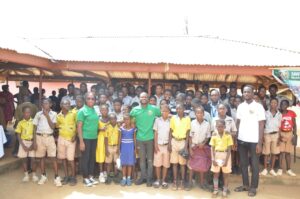
The Director-General of the Ghana AIDS Commission (GAC), Steve Kyeremeh Atuahene, has expressed concerns about the disregard for education on HIV, saying that is part of the causes of the alarming figures on infections, especially, among the youth.
He has therefore cautioned the citizenry, especially the youth, not to think that the country is out of the woods as far as the fight against the epidemic is concerned.
Speaking in a number of media interviews, Mr Kyeremeh Atuahene explained that the high rate of infections among young people poses a big threat to the fight against HIV/AIDS in the country.
He noted that 15 to 24-year-olds are getting infected by having sex with older people.
“While some of the older men and women take advantage of the vulnerabilities of some of the young people, many of the young people voluntarily have sex with older men and women for financial gains,” he added.
Alarming statistics
Ghana recorded new HIV infections of 18,928 in the year 2020, bringing the number of people living with the virus to a cumulative figure of some 346,129 at the end of the year. AIDs related deaths for the year was 12,758.
Out of the total HIV population, females constitute 66 per cent while males constitute 34 per cent of the figure. Also, 92 per cent of those carrying the virus are adults within the age bracket of 14 and above, while children from 14 years and below constitute two per cent of those carrying the virus.
For the new infections of over 18,000, females make up 83 per cent of those infected while the male population is 17 per cent. Again, out of the figure, 53 per cent are adults aged 25 years and above; 28 per cent are young adults between 14 and 25 years; while children below 14 years constitute 19 per cent of the infected.
Still concern
Providing an update on the country’s HIV and AIDs response during a media engagement in Koforidua over the weekend, Mr Kyeremeh Atuahene said HIV still remains a public health concern because it is among the 10 top causes of deaths in the country.
He expressed worries about the fact that even though treatment exists to suppress the viral load and keep those carrying the virus alive, people are still dying because they either do not access the treatment or do not have access to same.
“There are many people infected with HIV who should be on treatment, but are not. Some resort to herbal treatments, and are made to believe claims that they are healed, and therefore stop accessing treatment,” he stated.
Mr Atuahene advised those living with the virus to commit to their treatment, explaining that “treatment helps to break the chain of infections by suppressing the viral load of the infected person so that after sometimes the virus is no longer transmittable from the infected person.”
Vulnerability
The GAC Director-General explained that the most vulnerable groups when it comes to HIV infections are men who sleep with men(MSM) and sex workers, who are 10.6 times and four times at risk, respectively, of getting infected with the virus.
He said in the fight against the epidemic, the focus must first be on these groups and their partners in order to break the chain of infections. “We don’t support their activities; all we are interested in is the health of the public,” he stressed.
Mr Atuahene stated categorically that the Ghana Aids Commission is not against the LGBTIQQAAP+ bill. The Commission, he said, is however concerned that some provisions in the bill in its current form could pose a challenge to its work.
He fears some provisions in the bill “will drive key populations underground, and when that happens they will not access HIV services, and that can lead to the spread of the virus.”









Can you be more specific about the content of your article? After reading it, I still have some doubts. Hope you can help me.
Your point of view caught my eye and was very interesting. Thanks. I have a question for you.